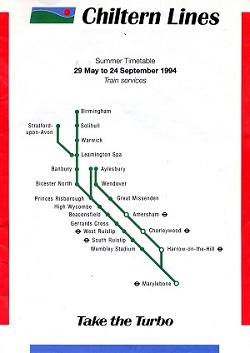

  |
6 December 2025 | Business Spotlight | Editorial Extra | News | Podcasts | About us | Home | 6 |
| Privatisation The start of the privatisation of the core railway is an elusive date to pin down. It could be argued to have been the publication of the White Paper in 1992, the passing of the Railways Act in late 1993 or the start of the first passenger franchises in February 1996. Until this last date, apart from the complete ‘hivings-off’ of such activities of hotels, ships, Travellers’ Fare station catering and British Rail Engineering, private sector participation in the railway had been confined to a few routes and services, such as the Foster Yeoman stone trains from Somerset. In the spring of 1994 Railtrack was detached from BR and became a separate organisation – although still in the public sector.  Chiltern Railways TOU The three BR passenger businesses ceased to exist at the same time, and their routes were divided between 25 new ‘train operating units’ – five of which became ‘shadow franchises’ in April alongside Gatwick Express, which had already become the first ‘shadow’ in October 1993. The territories of the TOUs were based on existing ‘profit centres’ within the previous passenger businesses. Rolling stock was transferred to three new BR companies known as ROSCos, which were expected to become rolling stock leasing companies in the private sector by the end of 1995, while three new freight companies – Loadhaul, Mainline Freight and Transrail Freight – took over Trainload Freight’s existing contracts on 1 April 1994. The transfer of British Rail’s train operating units to the private sector was the task of the new Office of Passenger Rail Franchising, and by the second half of 1995 OPRAF was preparing to let the first of 25 contracts.  300.jpg) South West Trains The first franchises were awarded in late 1995, with the pioneering signatures being placed by Stagecoach Holdings on the South West Trains franchise on 19 December. The pens were needed again the following day, when the Great Western franchise was signed by Great Western Holdings – a management and employee buyout supported by 3i and FirstBus. The third franchise to be signed was LTS – London, Tilbury and Southend – which had frequently been put forward in the past as a natural candidate for early privatisation because of the self-contained nature of its route. The successful bid had been made by its existing BR managers, who had obtained the backing of 3i and Gresham Trust and were trading as Enterprise Rail. The start of the LTS franchise was delayed by the discovery of ‘ticketing irregularities’, but the other two began business on 4 February 1996. LTS was re-awarded to Prism Rail on 9 May and started on 26 May.
 300.jpg) GNER By then Connex South Central, Gatwick Express, GNER and Midland Mainline had also begun on 28 April. The next franchise, Chiltern Railways, did not begin until 21 July and then Cardiff Railway, Connex South Eastern, Island Line, South Wales & West and Thames Trains all started on 13 October. Anglia Railways, CrossCountry, Great Eastern and West Anglia Great Northern all began on 5 January 1997, to be followed by Merseyrail Electrics on the 19th of the same month.This left Central Trains, North Western, Regional Railways North East, Silverlink and Thameslink, which started on 2 March, with West Coast Trains following a week later. ScotRail came at the tail of the queue on 31 March – having been delayed, it was said, by detailed negotiations with Strathclyde Passenger Transport Executive. In all, 25 passenger franchises had been launched over a period of just under 14 months, and with the start of ScotRail the British Railways Board ceased to be an operator of passenger services. Railtrack was floated on the Stock Exchange on 20 May 1996.   |
For all Railnews advertising call David Longstaff on +44 (0)1438 281210 |
Contact us Copyright statement Site map Terms and Conditions |